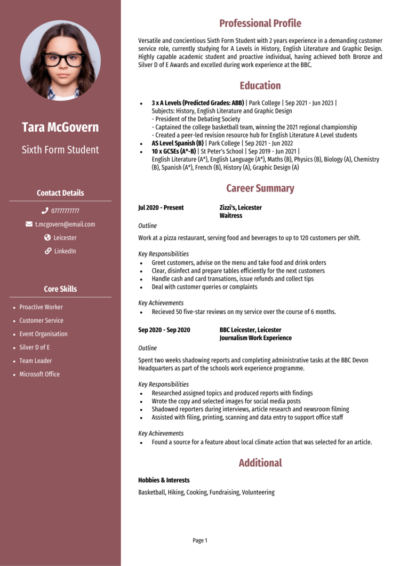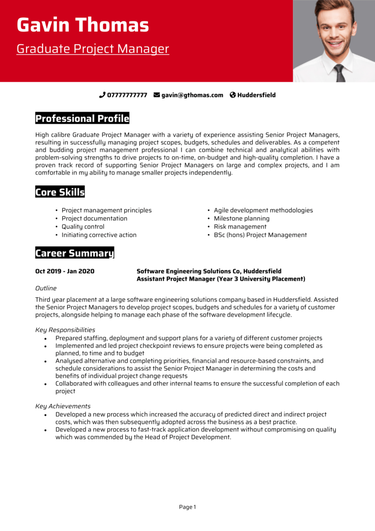You might not have a packed-out CV (yet), but don’t underestimate what you’ve already achieved. Sixth form is about more than just classes – it’s where you start developing the kind of skills employers actually care about: time management, communication, teamwork, and motivation.
This guide (with a Sixth Form Student CV example) will show you how to make the most of what you’ve done so far – so you can apply for jobs, apprenticeships, or uni placements with a CV that’s tailored to your goals.
Sixth Form Student CV sample
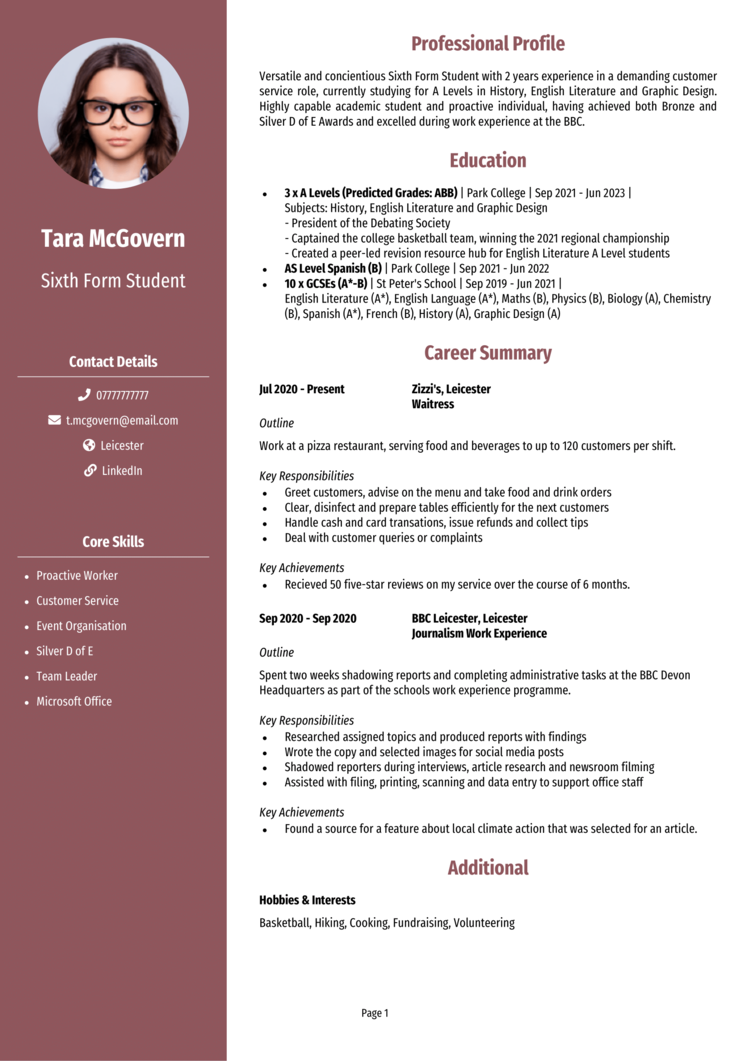
How to write your Sixth Form Student CV
Discover how to create a quality Sixth Form Student CV with this simple step-by-step guide.
Writing a CV for the first time can feel like trying to write about yourself with nothing to say – but you’ve got more experience than you think. Whether it’s school projects, weekend jobs, sports teams, or volunteering, there are plenty of ways to show what you’re capable of.
In this guide, you’ll learn how to talk about your strengths without sounding awkward and write something that actually makes people want to meet you – even if you’ve never had a job before.
The best way to structure and format your Sixth Form Student CV
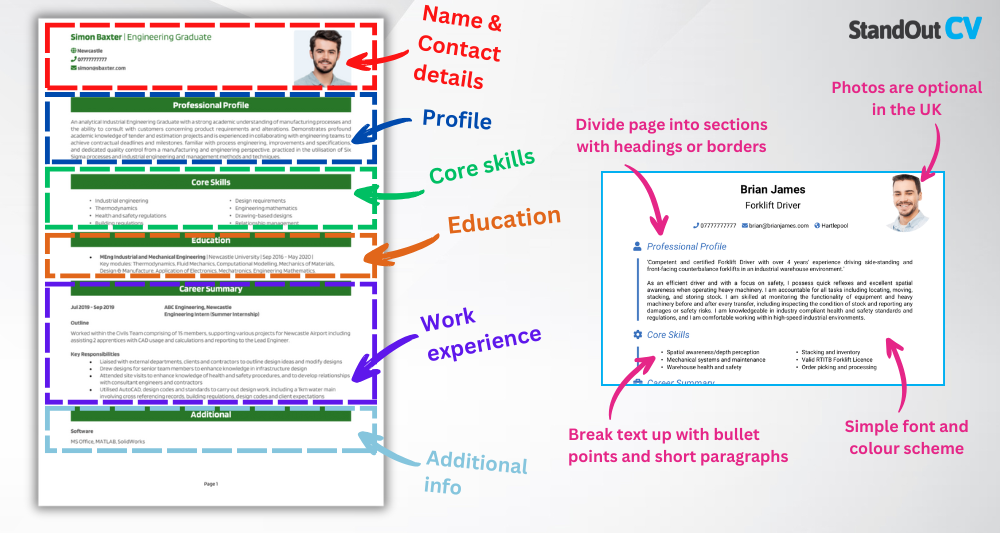
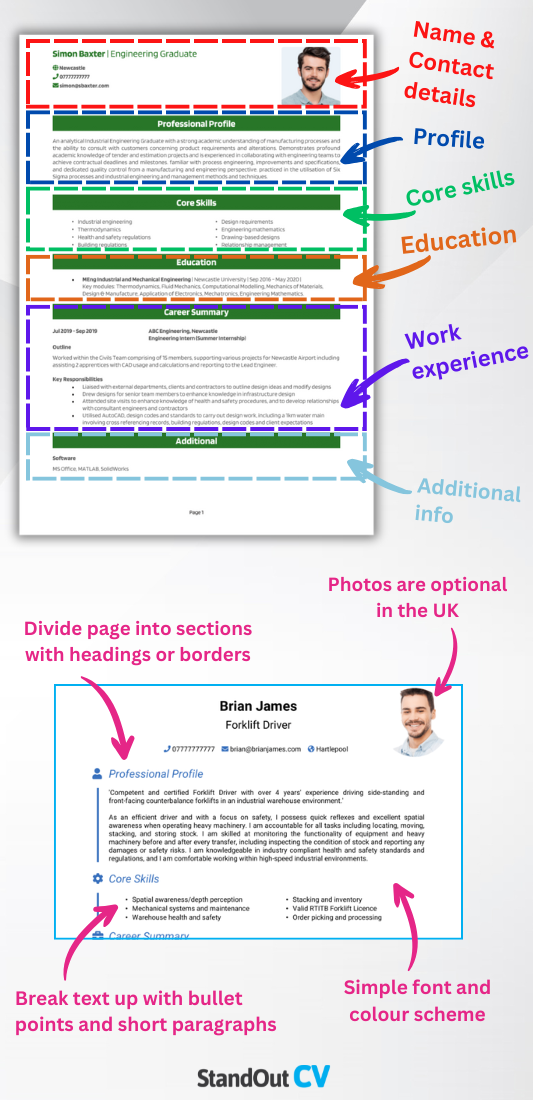
You might not have a full career history yet, but that’s okay – what matters now is showing you’re organised and ready to learn. A well-laid-out CV structure makes that clear straight away. It helps employers find the key info fast, shows that you’ve taken the application seriously, and gives you a proper edge over other applicants who didn’t bother with a coherent layout.
Here’s the layout to follow:
- Name and contact details – Keep your name and personal details front and centre at the top. Whether or not to include a photo is your decision.
- Profile – Start with a snapshot of your skills, career highlights, and professional aspirations.
- Core skills – Focus on core skills makes it easy for employers to see your key strengths at a glance.
- Work experience – Mention any work experience you’ve got, even things like volunteering and work shadow placements.
- Education – Provide details on your academic background, including certificates and the expected completion date of your current studies.
- Additional info – Optional extras like hobbies and interests, awards, or languages.
Use bullet points where it helps to break things up, divide your sections with clear headings, and choose a clean, readable font. One page is usually enough length at this stage. If your CV format looks neat and easy to follow, you’re already making a great first impression.
What is a Sixth Form Student CV profile?
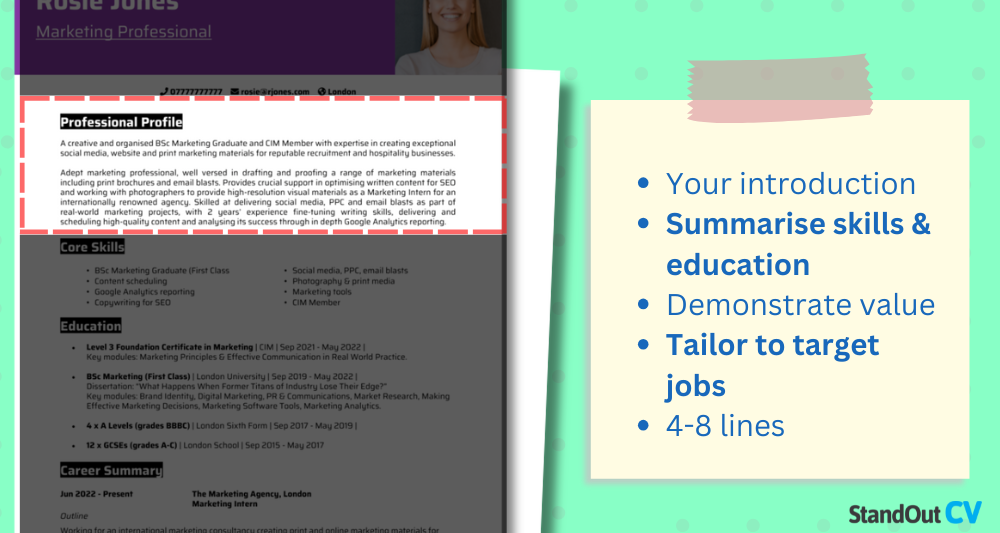
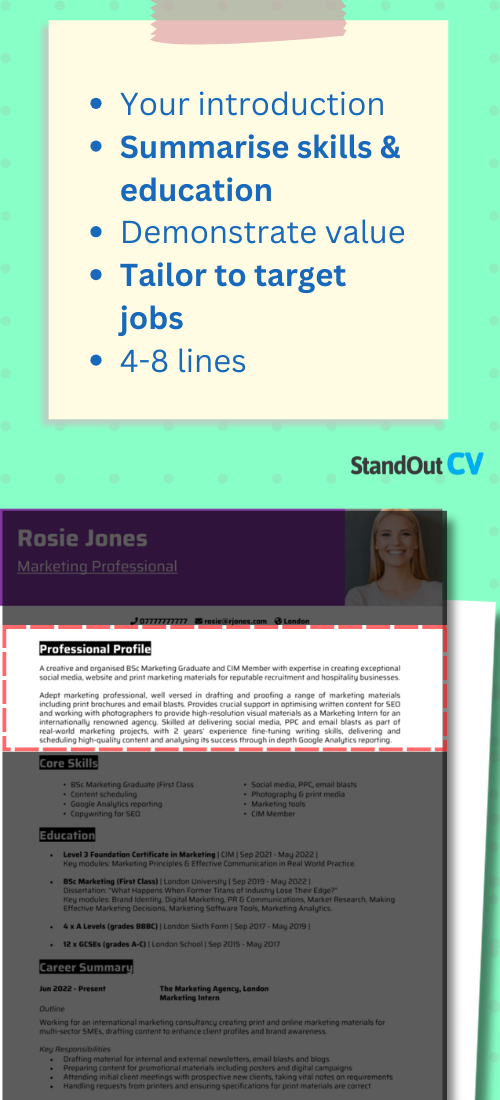
Your CV profile is where you introduce yourself – quickly. It should tell the employer what stage you’re at in your education and what you can bring to the role. It’s your chance to show that you’re mature and enthusiastic about starting work or training. A personal statement should go into more depth about your aspirations, which is ideal for a junior candidate with little to no experience.
Sixth Form Student CV profile examples
Profile 1
Reliable sixth form student with experience volunteering at a local charity shop. Demonstrates a strong work ethic, attention to detail, and the ability to communicate effectively with customers. Keen to gain more experience in retail or customer-facing roles while continuing studies.
Profile 2
Enthusiastic and well-organised student currently completing A-Levels, with part-time experience working in a café. Capable of handling busy environments, working in a team, and delivering friendly service. Interested in gaining more experience in hospitality or customer service.
Things to have in your Sixth Form Student CV profile
Here’s what to include:
- What you’re studying – Your sixth form, college, and subject focus.
- Your top qualities – Reliable, hardworking, willing to learn, good with people, etc.
- What you’re looking for – A part-time job, apprenticeship, internship, or career starter.
- Why you’d be a good fit – Mention any relevant experience or personal strengths.
- Your approach – Show you’re positive, eager, and ready to contribute.
How to highlight your core skills
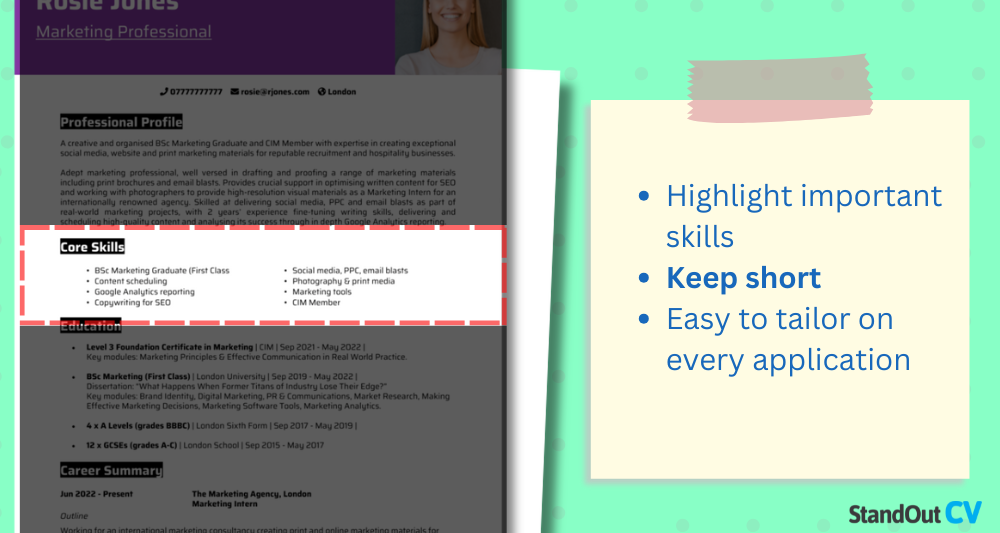
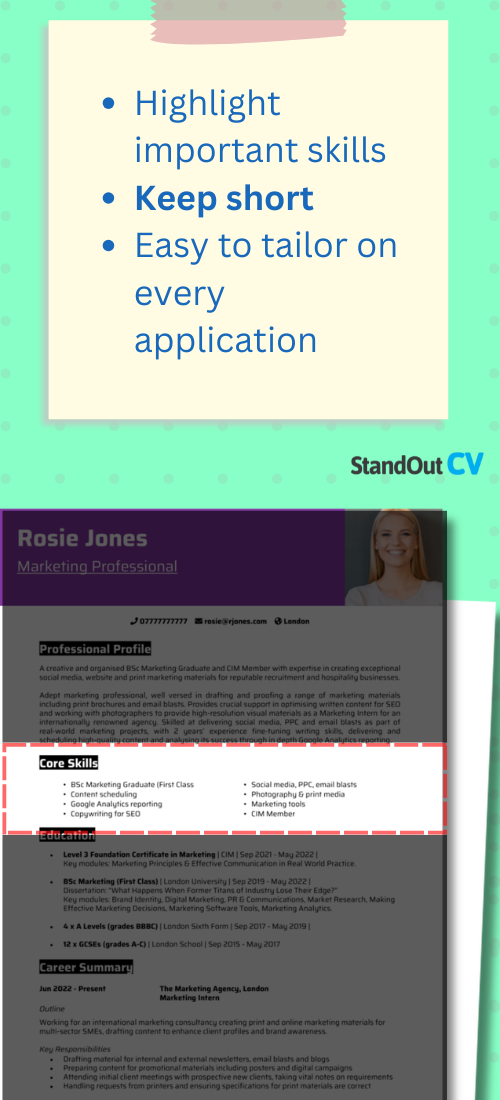
Think of this section as a quick-fire summary of what makes you a strong candidate. It doesn’t need to be technical – but it should reflect the kinds of strengths you’ve shown in school and any work experience you might have.
These might include CV skills like communication, teamwork, customer service, punctuality, problem-solving, or digital literacy. It’s okay to be simple here – just make sure what you include is honest and relevant to the role you want.
Essential skills for a Sixth Form Student CV
- Academic Research and Writing – Producing structured essays and reports across subjects using critical thinking and credible sources.
- Time Management and Organisation – Balancing coursework, deadlines, and extracurricular commitments effectively.
- ICT and Digital Literacy – Using software such as Microsoft Office, Google Workspace, and online platforms for assignments and presentations.
- Independent Study Skills – Managing personal learning through note-taking, revision planning, and exam preparation.
- Team Collaboration – Participating in group projects, debates, or classroom discussions to develop cooperative working skills.
- Presentation and Public Speaking – Creating and delivering clear, confident presentations in class or during assessments.
- Analytical Thinking – Interpreting data, evaluating arguments, and forming reasoned conclusions in subjects like science, economics, or history.
- Communication Skills – Writing clearly, engaging in discussions, and adapting communication style across academic and informal contexts.
- Problem-Solving Abilities – Applying logic and subject knowledge to overcome challenges in subjects like maths, physics, or computing.
- Leadership and Initiative – Taking part in student council, clubs, or volunteer roles to demonstrate responsibility and proactivity.
Structuring your education section
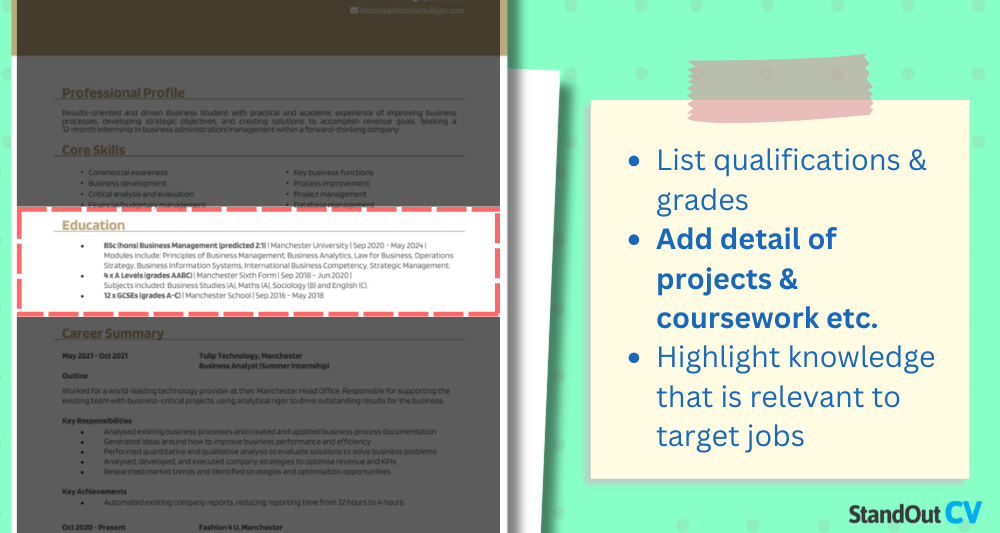
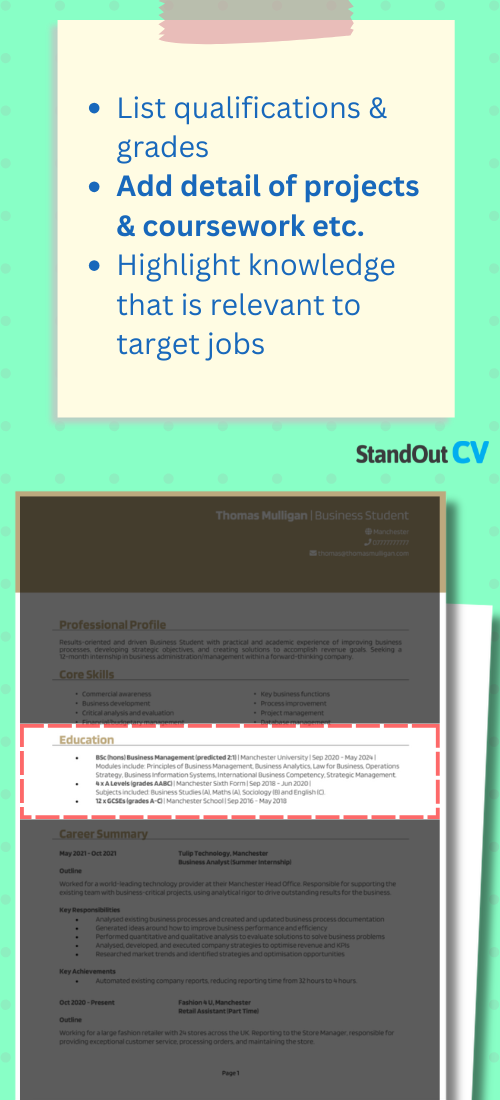
At this stage, your education is one of your strongest assets. Make it clear and easy to follow. List your current sixth form or college, your A-level or BTEC subjects, and expected grades or predicted grades if you have them. You can also include GCSE results, especially if they’re relevant to the role.
If you’ve done any extra training – like food hygiene or first aid – include them too. These can help show you’re serious about developing useful skills for work.
Example education sections
Education 1
Studying A-Levels in Biology, Psychology, and English Literature | Southgate Sixth Form College | 2025–2027 (expected)
On track to achieve AAB. Completed coursework on developmental psychology and literary analysis. Active member of the college’s peer mentoring programme.
10x GCSEs (9–5) including Maths (7), English Language (6), and Combined Science (7–6) | Hammersmith Academy | 2020–2022
Level 2 Award in Emergency First Aid at Work | British Red Cross | 2023
Education 2
A-Levels in History, Business Studies, and Sociology | Trinity Park Sixth Form | 2021–2023
Achieved grades ABB. Completed an independent research project on the impact of social media on consumer behaviour. Served as a student ambassador during college open days.
9x GCSEs (9–4) including English Literature (7), Maths (5), and History (8) | Eastbrook Secondary School | 2019–2021
Level 2 Food Safety and Hygiene Certificate | Virtual College | 2022
What to include in your education section
For each qualification, add the following info:
- Qualification & organisation – Name the qualification and the institution which awarded it (i.e. your school).
- Dates studied – Give the start and finish years, or the expected finish year if you’re still studying.
- Extra details – Especially relevant modules or subjects could be given a little extra detail, to really convey your fit for the roles you’re applying for.
Top qualifications to showcase on a Sixth Form Student CV
- GCSEs (English, Maths, and Science) – Core subjects that most employers will expect.
- A-levels or BTEC Courses – Your current study focus and predicted grades.
- Basic First Aid Training – Useful for care, education, or retail environments.
- Food Hygiene Certificate (Level 1 or 2) – Great for hospitality or customer service roles.
- Digital Skills / Microsoft Office / IT Certification – Helpful for admin or office-based jobs.
How to showcase your work experience in your CV
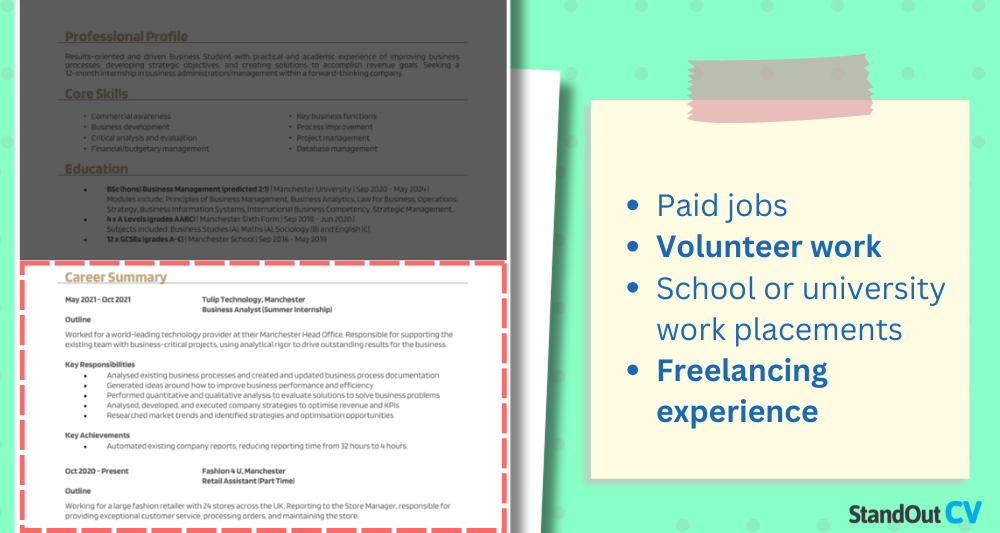
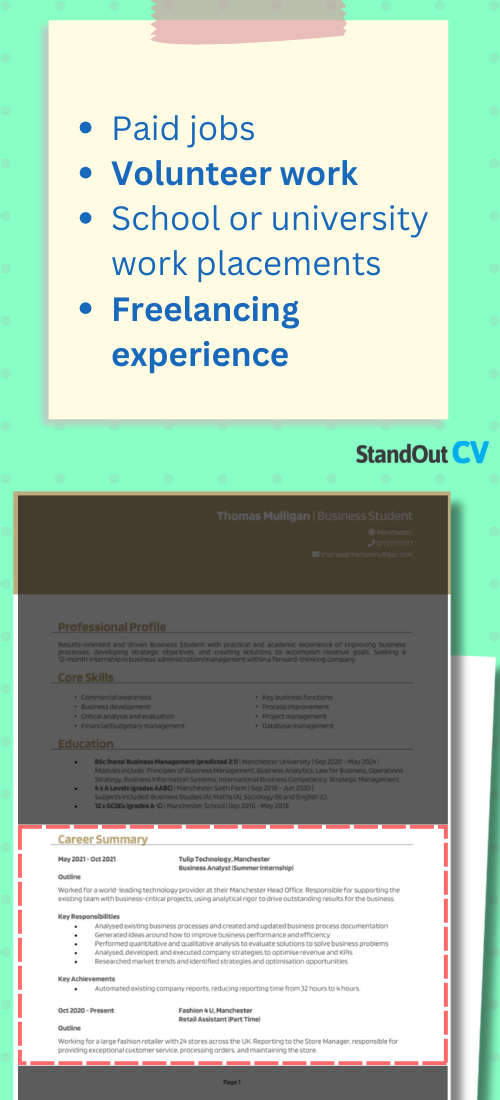
Whether it’s a part-time retail job or a one-off volunteering day – you’ve probably done something that counts as experience. You’re not going to overwhelm the recruiter with decades of experience, and that’s fine – the key here is showing recruiters responsibility and willingness to work hard.
List the roles in reverse order (with the most recent first). Include your role, where you did it, and when. Then use bullet points to explain what you did, focusing on practical tasks and soft skills you developed.
How to format previous jobs in your CV correctly
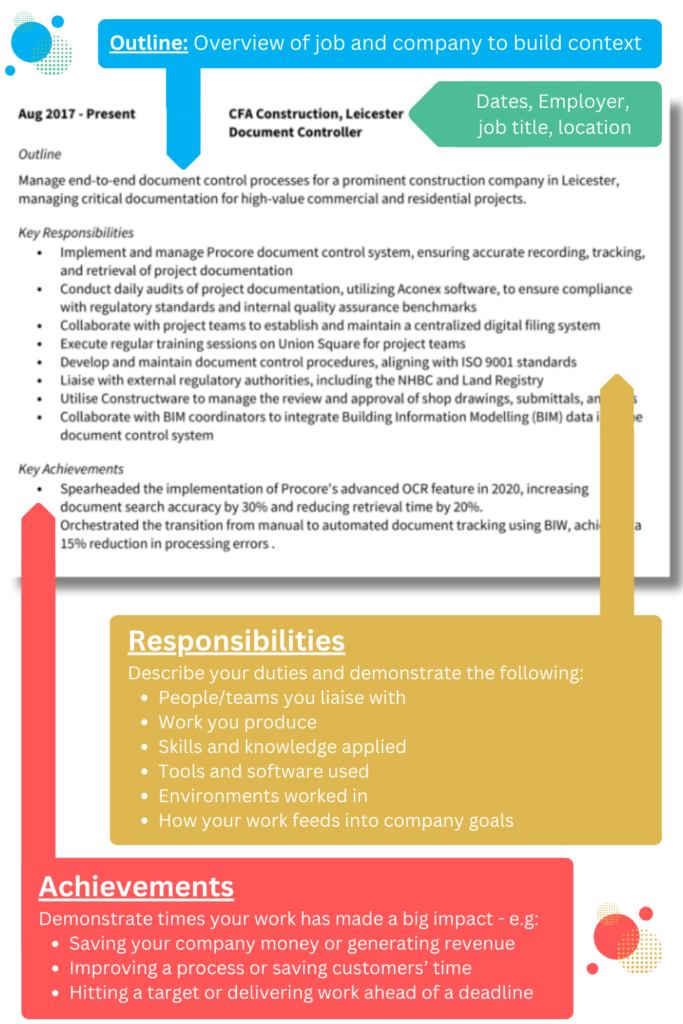
- Outline – Name the organisation, what your role was, and what it involved.
- Responsibilities – Use simple action words like “helped,” “served,” “organised,” “supported,” or “delivered.”
- Achievements – If possible, highlight positive outcomes: “Kept stockroom organised,” “Assisted 20+ customers daily,” “Completed training in first week.”
Example work history for Sixth Form Students
Retail Volunteer | St Ann’s Charity Shop
Outline
Supported the day-to-day running of a local charity shop, assisting staff and engaging with customers on the shop floor.
Responsibilities
- Organised donated stock and rotated items for display.
- Handled basic till operations and processed card and cash payments.
- Assisted customers in finding items and answering general queries.
- Maintained a clean and tidy shop environment.
- Helped with visual merchandising and creating seasonal displays.
Achievements
- Praised by shop manager for positive attitude and punctuality.
- Helped increase sales during busy donation periods with efficient restocking.
- Gained confidence in speaking to a wide range of customers.
Cafe Assistant | The Corner Bean
Outline
Worked part-time in a local café during evenings and weekends, supporting front-of-house operations in a fast-paced environment.
Responsibilities
- Took customer orders, prepared drinks, and processed payments.
- Cleaned tables, restocked supplies, and ensured hygiene standards were met.
- Communicated clearly with kitchen staff during peak service times.
- Learned basic food handling and allergen awareness practices.
- Welcomed customers and handled general enquiries.
Achievements
- Received positive feedback from customers and supervisors for friendly service.
- Supported new starters by explaining basic café routines.
- Managed full counter service independently during slower shifts.
Additional info
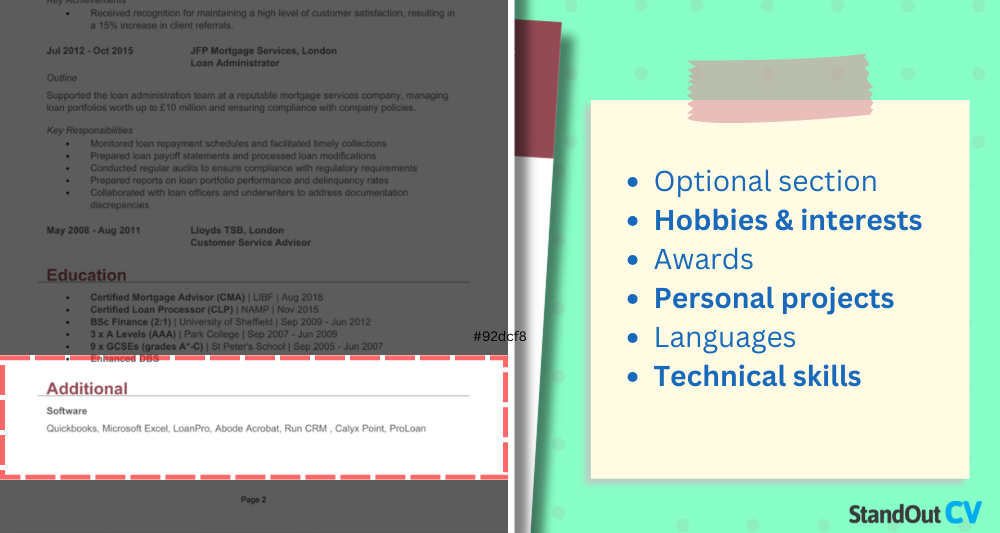
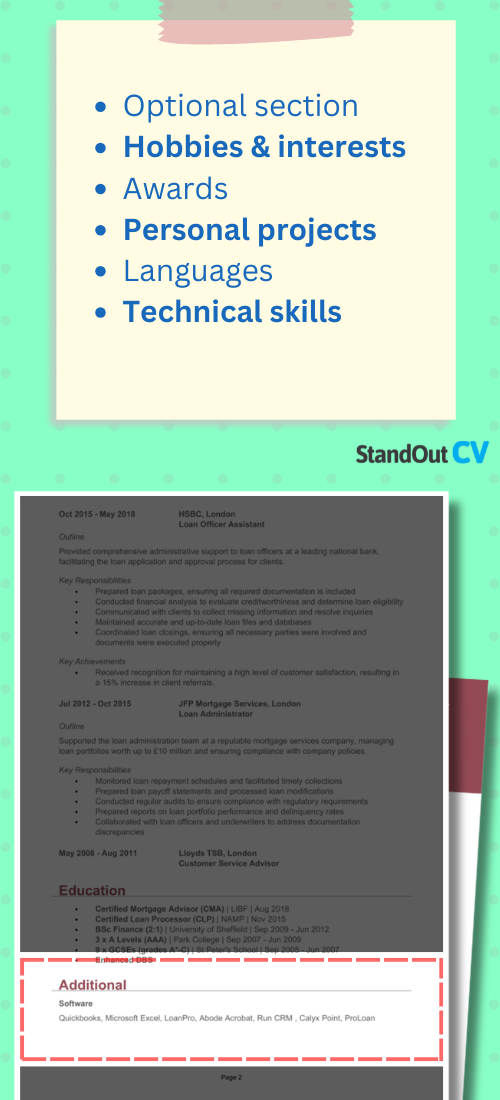
For sixth form students with limited experience, the Additional Information section is a chance to show your enthusiasm, character, and potential. Whether you’re applying for part-time work, university, or an apprenticeship, this section helps you stand out by highlighting personal interests, achievements, and activities that reflect key skills like responsibility, teamwork, and communication.
Good additional info for Sixth Form Student
- Hobbies – Choose interests that demonstrate initiative, creativity, or problem-solving – such as music, sport, content creation, or personal study. These give insight into your personality and transferable strengths.
- Awards and Achievements – School recognitions, subject awards, or achievements in sports or competitions help prove your commitment and drive.
- Extracurricular Activities – Participation in clubs, events, or leadership roles shows teamwork, initiative, and personal development outside the classroom.
- Personal Projects – Independent learning, creative work, or volunteering projects show a proactive mindset and eagerness to grow.
Additional info example
Additional info
Hobbies
Video editing – Edit short videos for personal projects and school assignments, learning to use tools like CapCut and DaVinci Resolve.
Playing the guitar – Build patience and focus through regular practice and performance in school music showcases.
Reading non-fiction – Enjoy reading about history, psychology, and current affairs to broaden general knowledge.
Awards and Achievements
Subject award for English Literature – Recognised for strong analytical skills and consistent effort.
100% attendance certificate – Demonstrates reliability, punctuality, and commitment to learning.
Extracurricular Activities
Eco club – Took part in school sustainability initiatives and organised awareness campaigns.
Form rep – Acted as a student voice in meetings, helping raise concerns and support classmates.


